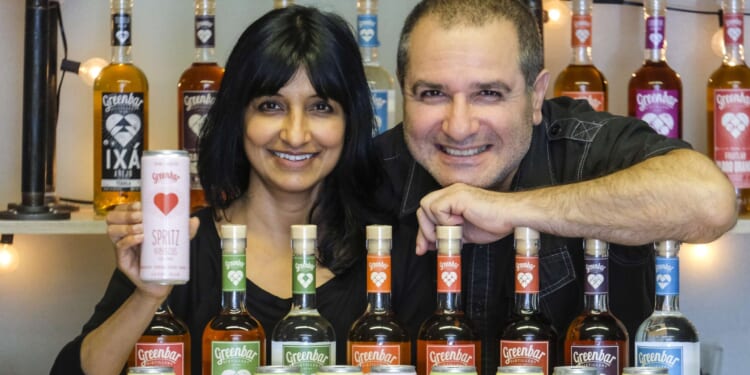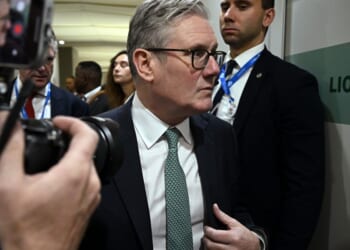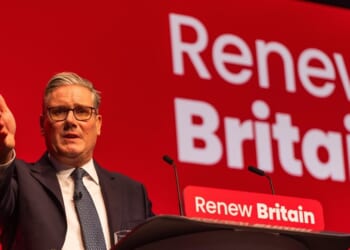Melkon Khosrovian recalls waiting for a shipment of bottles that were due to arrive amid the mad rush that marked the days before President Donald Trump’s tariffs took effect.
He remembers doing the math, too.
“We don’t have any control over when they clear [customs], and our taxes would have been $10,000 more,” if the container holding his bottles didn’t make it before the deadline, explains Khosrovian, who co-owns the Greenbar Distillery in Los Angeles. “In the meantime, we’re sitting here chewing our fingernails and wondering what’s going on.”
What a difference a day makes.
Khosrovian, an Armenian immigrant, founded the distillery with his wife more than two decades ago. Theirs may not be the sort of business typically regarded as blue-collar work, but Greenbar is essentially the same as any other American manufacturing firm. Khosrovian must buy equipment and raw materials, then use them to produce new goods that he distributes down the supply chain.
And like many other American manufacturers, he says Greenbar has suffered from Trump’s tariffs, which have made that equipment and those raw materials more expensive.
“We’re making American products, you know, selling American products, but it involves some parts that come from abroad,” Khosrovian told Reason in an interview on Monday. That includes the Bulgarian juniper berries that form the backbone of Greenbar’s gin and the various spices that add flavor to its premixed cocktails.
“Taxing that stuff just means that we’re weakened as a company,” he adds.
Greenbar is one of more than 700 small businesses that have joined the We Pay The Tariffs coalition, which is backed by the Trade Partnership, a pro-trade think tank. Last week, that coalition filed an amicus brief with the U.S. Supreme Court—one of dozens of such briefs filed by a wide range of interested parties including businesses, economists, and more than 200 members of Congress—urging the justices to uphold lower court rulings that called Trump’s tariffs unlawful.
The tariffs, which were “imposed without legal authority and with no public participation, comment, or even sufficient notice,” represent “an existential threat to survival” for many small businesses, the group argues in its brief.
The Trump administration argues that the president has nearly unchecked authority to impose tariffs thanks to the International Emergency Economic Powers Act (IEEPA), a 1977 law Trump has invoked repeatedly since returning to office this year. Critics point out that the IEEPA statute does not even contain the word “tariff” and has never been used in this way. Lower courts have ruled that the president does not have unlimited tariff powers, even when invoking those emergency powers.
It will be those thorny legal matters that decide the fate of Trump’s tariffs when the Supreme Court hears the case next week. However, small business owners like Khosrovian offer a reminder of what’s at stake in the case.
Higher costs from tariffs have forced Khosrovian to look into automating part of Greenbar’s bottling process to save money, which would mean laying off some of the staff who handle that now, he says. In the competitive market for craft booze, that’s a better option than raising prices and losing market share.
In addition to making it more expensive for American distilleries to make booze, tariffs are also reducing sales abroad. Exports of American spirits fell 9 percent year-over-year in the second quarter, according to data from the Distilled Spirits Council of the United States, a trade association.
“Persistent trade tensions are having an immediate and adverse effect on U.S. spirits exports,” Chris Swonger, president and CEO of DISCUS, said in a statement earlier this month. “There’s a growing concern that our international consumers are increasingly opting for domestically produced spirits or imports from countries other than the U.S., signaling a shift away from our great American spirits brands.”
The Trump administration believes it must punish American companies like Greenbar Distillery in order to solve the perceived threat of a trade imbalance. When you get right down to it, however, the execution of this policy appears somewhat ridiculous. Can empty whiskey bottles or imported juniper berries realistically be called a threat that requires such sweeping executive powers? Is forcing Khosrovian to pay higher taxes going to accomplish anything?
“We proudly make things here, and we want to keep making more things here,” Khosrovian says. “Running a business normally is tough. Running a business where you don’t even know what things cost from day to day makes it doubly hard.”

















